Overview
- Brief Narrative
- Tikkun prayer book brought with Ruth Liebermensch, who, with her sister Hanna, fled Mannheim, Germany, for Great Britain on a Kindertransport in summer 1939, and then went to New York in May 1940. Ruth and Hanna’s father Samuel was killed in Auschwitz in September 1942. A Tikkun is a copy of the Pentateuch, the Five Books of Moses, used to practice Torah readings. This book includes the readings from the Prophets for the entire year plus the five Scrolls.
- Title
- Tikkun prayer book
- Date
-
publication:
1931
- Geography
-
publication:
Rodelheim (Frankfurt am Main, Germany)
- Credit Line
- United States Holocaust Memorial Museum Collection, Gift of Ruth Knox and Hanna A. Lewin
- Contributor
-
Publisher:
Lehrberger & Co.
Subject: Ruth L. Knox
- Biography
-
Ruth Liebermensch was born on February 6, 1925, in Mannheim, Germany, to a Jewish couple, Samuel and Gisela Schiff Liebermensch. She had a sister, Hanna Amalie, born on May 18, 1920. Samuel was born on February 24, 1887, in Pless (now Pszczyna, Poland), to Moritz and Rosa Liebermensch. Gisela was born on September 30, 1890, in Angenrod, to Max and Pauline Schiff. She had a brother, Fritz. Samuel was in the German Army during World War I (1914-1918). He and Gisela were engaged on August 15, 1916, and married on February 12, 1918, in Mannheim. Samuel was the cantor at the synagogue. He also taught bar mitzvah lessons, instructing students in Hebrew and Jewish history. Gisela was a professional singer, a soprano specializing in Wagner and Schubert lieder. Ruth was close with her maternal grandparents. Her grandfather Max was the shamas at the synagogue and assisted with synagogue services.
In January 1933, Hitler came to power in Germany and an antisemitic Nazi dictatorship was established. Ruth took dance lessons and had to avoid groups of Hitler Youth on her way home. Ruth’s father was summoned to the Gestapo because he purchased two cameras. Kosher meat was rationed. On November 9 and 10, 1938, during Kristallnacht, the synagogue was burned down, as was the home of Ruth’s maternal grandparents, Max and Pauline. They came to stay with Ruth and her family. Several hours later, the Gestapo came and arrested Samuel and Max. After pleas at the police station, Max was allowed to return home. Samuel was held in Buchenwald concentration camp for four weeks before being released. Samuel and Gisela wanted to flee Germany for the United States but had to wait for their quota numbers. They decided to send their daughters to England on the Kindertransport [Children's Transport]. About June 1939, Ruth, 13, and Hanna, 18, were sent to Leeds, England. The war began when Germany invaded Poland on September 1, 1939. The Kindertransport children were moved to the countryside for their safety. Ruth and Hanna lived in Lincolnshire, where Ruth attended public school and Hanna was a nurse. Ruth still corresponded with her parents through a family friend, Gustav Wuerzwewiler, in Brussels, Belgium.
Ruth and Hanna eventually received their visas for the US. On February 13, 1940, the sisters sailed from Southampton on the SS DePless, Poland Grasse, arriving in New York on February 26. Their maternal uncle Fritz lived in New York and sponsored them. Ruth’s parents attempted to join them in the US but Samuel, who was on the very restrictive Polish visa quota, was unable to obtain a visa. On May 4, 1940, their mother Gisela sailed from Genoa, Italy, on the SS Manhattan, arriving in New York on May 13. Hanna met a corporal in the US Army, Richard Pfifferling. Richard was born on December 31, 1914, in Lauterbach, Germany, to Alexander and Auguste Reiss Pfifferling. He fled Germany for New York in September 1939. Ruth and Richard married in 1944. The war ended when Germany surrendered on May 7, 1945.
After Richard was discharged from the army, the couple opened an orthopedic shoe store and repair business, the Tip Top Store. They eventually learned that Ruth's father Samuel and Richard's parents had perished. On October 22, 1940, Samuel was deported from Baden, Germany, to Gurs internment camp in France. On February 28, 1941, he was sent to Noe internment camp, then transferred on June 16 to Milles internment camp. On September 13, 1942, he was sent from Rivesaltes transit camp to Drancy transit camp. On September 16, Samuel was deported to Auschwitz-Birkenau concentration camp, where he was killed. Richard’s parents, Alexander and Auguste, were deported to Riga, Latvia in December 1941, and to Auschwitz in August 1942, where they were killed. Ruth’s maternal grandfather Max survived and emigrated to New York in 1946. Hanna married Mr. Lewin and had children. Ruth’s husband Richard, 50, died on February 8, 1965. On November 3, 1975, Ruth married Emil Knox, who was born on January 12, 1904, in Krakow, Poland, to Jacob and Regina Schinagel Knopf. Emil emigrated from St. Nazaire, France, to New York in May 1940. Ruth’s mother Gisela, 97, died on February 21, 1988. Emil, 85, died on April 7, 1989. Ruth’s sister Hanna, 94, died on March 7, 2015.
Physical Details
- Language
- Hebrew
- Classification
-
Books and Published Materials
- Category
-
Books and pamphlets
- Object Type
-
Prayer books (lcsh)
- Physical Description
- 22 cm.
- Materials
- overall : paper, ink
Rights & Restrictions
- Conditions on Access
- No restrictions on access
- Conditions on Use
- No restrictions on use
Keywords & Subjects
Administrative Notes
- Legal Status
- Permanent Collection
- Provenance
- The Tikkun prayer book was donated to the United States Holocaust Memorial Museum in 1990 by Ruth Knox and Hanna Lewin.
- Funding Note
- The cataloging of this artifact has been supported by a grant from the Conference on Jewish Material Claims Against Germany.
- Record last modified:
- 2022-07-28 17:44:39
- This page:
- https://collections.ushmm.org/search/catalog/irn2993
Download & Licensing
In-Person Research
- By Appointment
- Request 21 Days in Advance of Visit
- Plan a Research Visit
- Request to See This Object
Contact Us
Also in Richard Pfifferling and Ruth Pfifferling Knox family collection
The collection consists of a tefillin set and storage pouch, two tallits, a tallit storage pouch, a stole, publications, and photographs relating to the experiences of Richard Pfifferling, who left Germany for the United States in 1939, and of documents, photographs, and publications relating to the experiences of his wife, Ruth Liebermensch (later Knox), and her sister, Hanna Liebermensch (later Lewin), who left Germany on a Kindertransport in 1939.
Date: approximately 1914-approximately 1946
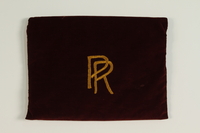
Monogrammed tallit pouch brought with a German Jewish refugee
Object
Monogrammed tallit pouch brought with Richard Pfifferling when he left Dresden, Germany, for New York in September 1939. Richard received the pouch and other religious items as a gift for his bar mitzvah circa 1927. In 1933, the Nazi regime came to power and enacted laws that persecuted Jews. Richard and his brothers, Otto and Ernst, fled Germany but their parents, Alexander and Auguste, were unable to leave. Richard later served in the US Army during the war. Richard’s parents were deported to Riga, Latvia, in December 1941, and killed in Auschwitz in August 1942. In 1944, he married Ruth Liebermensch, who, with her sister Hanna, fled Germany for England on a Kindertransport in summer 1939, and arrived in New York in May 1940. Ruth and Hanna’s father Samuel was killed in Auschwitz in September 1942.
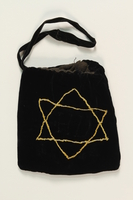
Tefillin pair and embroidered pouch brought with a German Jewish refugee
Object
Set of tefillin and embroided storage pouch brought with Richard Pfifferling when he left Dresden, Germany, for New York in September 1939. Richard received the tefillin, pouch, and other religious items as a gift for his bar mitzvah circa 1927. In 1933, the Nazi regime came to power and enacted laws that persecuted Jews. Richard and his brothers, Otto and Ernst, fled Germany but their parents, Alexander and Auguste, were unable to leave. Richard later served in the US Army during the war. Richard’s parents were deported to Riga, Latvia, in December 1941, and killed in Auschwitz in August 1942. In 1944, he married Ruth Liebermensch, who, with her sister Hanna, fled Germany for England on a Kindertransport in summer 1939, and arrived in New York in May 1940. Ruth and Hanna’s father Samuel was killed in Auschwitz in September 1942.
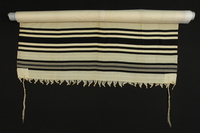
White wool tallit with black stripes brought with a German Jewish refugee
Object
White wool tallit with black stripes brought with Richard Pfifferling when he left from Dresden, Germany, for New York in September 1939. Richard received the tallit, or prayer shawl, and other religious items as a gift for his bar mitzvah circa 1927. In 1933, the Nazi regime came to power and enacted laws that persecuted Jews. Richard and his brothers, Otto and Ernst, fled Germany but their parents, Alexander and Auguste, were unable to leave. Richard later served in the US Army during the war. Richard’s parents were deported to Riga, Latvia, in December 1941, and killed in Auschwitz in August 1942. In 1944, he married Ruth Liebermensch, who, with her sister Hanna, fled Germany for England on a Kindertransport in summer 1939, and arrived in New York in May 1940. Ruth and Hanna’s father Samuel was killed in Auschwitz in September 1942.
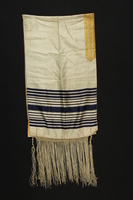
White silk tallit with black stripes brought with a German Jewish refugee
Object
White silk tallit with black stripes brought with Richard Pfifferling when he left Dresden, Germany, for New York in September 1939. Richard received the tallit, or prayer shawl, and other religious items as a gift for his bar mitzvah circa 1927. In 1933, the Nazi regime came to power and enacted laws that persecuted Jews. Richard and his brothers, Otto and Ernst, fled Germany but their parents, Alexander and Auguste, were unable to leave. Richard later served in the US Army during the war. Richard’s parents were deported to Riga, Latvia, in December 1941, and killed in Auschwitz in August 1942. In 1944, he married Ruth Liebermensch, who, with her sister Hanna, fled Germany for England on a Kindertransport in summer 1939, and arrived in New York in May 1940. Ruth and Hanna’s father Samuel was killed in Auschwitz in September 1942.
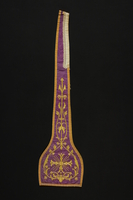
Embroidered priest's stole owned by a German Jewish refugee
Object
Catholic priest's vestment with French style spade ends owned by Richard Pfifferling. Richard was Jewish and how and when he acquired the stole is not known. In 1933, the Nazi regime came to power and enacted laws that persecuted Jews. Richard and his brothers, Otto and Ernst, fled Dresden, Germany; his brothers to England and Argentina and Richard, in September 1939, to the United States. Their parents, Alexander and Auguste, were unable to leave. Richard later served in the US Army during the war. Richard’s parents were deported to Riga, Latvia, in December 1941, and killed in Auschwitz in August 1942. In 1944, he married Ruth Liebermensch, who, with her sister Hanna, fled Germany for England on a Kindertransport in summer 1939, and arrived in New York in May 1940. Ruth and Hanna’s father Samuel was killed in Auschwitz in September 1942.
Bible
Object
Torah brought with Ruth Liebermensch, who, with her sister Hanna, fled Mannheim, Germany, for Great Britain on a Kindertransport in summer 1939, and then went to New York in May 1940. The book is stamped Israelitische Gemeinde Mannheim [Jewish Community Mannheim.] Ruth and Hanna’s father Samuel was killed in Auschwitz in September 1942.



